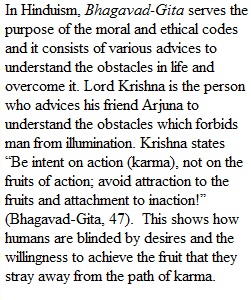


Q Please answer two of the following three reading explorations. Be sure to read the textbook’s introductory matter for each reading in order to help with context, but do not simply reiterate Fiero's commentary as your answer; support your answer from the primary source text itself. Your answers are due via Blackboard on [Week 3, Day 1]: 1. Read the excerpt from the Bhagavad-Gita (please see the attached document, sections 47-68). Please answer the following question: What are the obstacles to illumination, according to Krisha? 2. Read the African poetry readings in the inset boxes on pages 248 and 249 of Fiero's Landmarks in Humanities, and then answer the question after each reading. 3. Read the excerpt from Cortés’ Letters from Mexico (please see the attached document). Please answer the following questions: What aspects of Aztec life and culture favorably impressed Cortes? Of which was he critical? A minimum of at least one full paragraph per question is required. Assignment purpose: This assignment will introduce you to important primary written sources in history, and in the process you will attain a more in-depth understanding of the cultures and historical periods under consideration for the week. You will also demonstrate your own comprehension of the readings by answering select questions given in the assignment instructions. This assignment will be accomplished by reading the assigned readings in the course textbook. (course objectives 2.1, 2.4, 2.5, 2.8, 4.1, 4.4) Grading: 1. Two reading explorations and their questions must be addressed according to the instructions. Addressing only one reading reflection will result in an automatic 20-point deduction. 2. All the questions in the chosen reading explorations must be answered. An automatic 15-point deduction per skipped question applies. 3. The answers must meet the requirement of one full paragraph per reading exploration. A full paragraph consists of a minimum of five sentences. 4. The answers are to be written in complete sentences, including proper grammar and spelling. Excessive writing errors will result in a deduction. 5. In-text citations giving line references to the textbook readings must be included. Failing to give references will result in a deduction.
View Related Questions